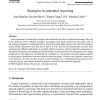Free Online Productivity Tools
i2Speak
i2Symbol
i2OCR
iTex2Img
iWeb2Print
iWeb2Shot
i2Type
iPdf2Split
iPdf2Merge
i2Bopomofo
i2Arabic
i2Style
i2Image
i2PDF
iLatex2Rtf
Sci2ools
122
Voted
COGSCI
2002
2002
Strategies in sentential reasoning
Four experiments examined the strategies that individuals develop in sentential reasoning. They led to the discovery of five different strategies. According to the theory proposed in the paper, each of the strategies depends on component tactics, which all normal adults possess, and which are based on mental models. Reasoners vary their use of tactics in ways that have no deterministic account. This variation leads different individuals to assemble different strategies, which include the construction of incremental diagrams corresponding to mental models, and the pursuit of the consequences of a single model step by step. Moreover, the difficulty of a problem (i.e., the number of mental models required by the premises) predisposes reasoners towards certain strategies. Likewise, the sentential connectives in the premises also bias reasoners towards certain strategies, e.g., conditional premises tend to elicit reasoning step by step whereas disjunctive premises tend to elicit incrementa...
Related Content
| Added | 17 Dec 2010 |
| Updated | 17 Dec 2010 |
| Type | Journal |
| Year | 2002 |
| Where | COGSCI |
| Authors | Jean-Baptiste Van der Henst, Yingrui Yang, Philip N. Johnson-Laird |
Comments (0)

